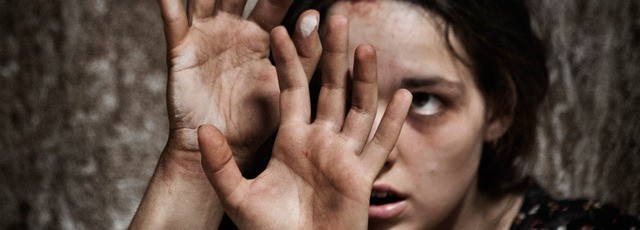-
SALVO (Fabio Grassadonia, Antonio Piazza 2013)--ND/NF
FABIO GRASSADONIA, ANTONIO PIAZZA: SALVO (2014)--ND/NF

SARA SERRAIOCCO IN SALVO
A new pair of filmmakers to reckon with in Italy
My sympathies were with Fabio Grassadonia and Antonio Piazza's first feature Salvo all the way, even when it disappointed expectations early on with its strange jump from a gun battle and mafia killing to an almost too close and prolonged focus on a beautiful blind girl, a relative of the assassinated man, who somewhat implausibly regains her sight. It's a wholly original mix, and the assassin, who goes into hiding in Sicily, where all this transpires, with the blind girl, has some of the chiseled, laconic mystery of Alain Delon in Jean-Pierre Melville's classic Le Samouräi. But the filmmakers are trying to pull a fast one on us, bringing out all the trappings of an Italian gangland thriller and just letting them wither away. That stuff is durable. It can't wither away. However the Sicilian interiors, overdecorated and decrepit in a Victorian-Italian way, the industrial exteriors, rusty, clanging and abandoned to mafiosi, are memorable. So is the light. And so are Palestinian actor Saleh Bakri as the assassin (who may bring Chemises Lacoste back in style), and Sara Serraiocco as the blind girl he literally loves to death. Talk about doomed romances. This is a genre-bender, with elements of noir thriller and operatic romance and some of the images, dialogue and pace of spaghetti western.
And there is the memorably odd piccolo-borghesi couple (played by Giuditta Perriera and Luigi Lo Cascio) at the first hideout, an old apartment, who serve Salvo (whose name,rather ironically, means "safe," as in "sano e salvo," "safe and sound," as well as being short for the common Sicilian name, Salvatore). And also Mario Pupella as the gnarly mafia boss who comes, in vain as it turns out, to call Salvo back to to do his duty, and kill.
But first of all Salvo (no name though till much later, when Rita, the blind girl, asks for it), a bodyguard, is cornered by some rival assassins on a road, and captures one and forces him to say who set them on him ("Renato") then executes the man. The scene shifts to Renato's house (darkened against the Palermo heat) and a long remarkable single-take sequence focused on Rita, at first sitting at a table listening to her favorite song, "Arriverà" by the Modà and Emma, and happily counting money, then gradually realizing that danger and death have invaded, and moving around gradually in growing terror. Remarkable sound design, light (dim, yet revealing), and acting by Sara Serraiocco introduce us at perhaps slightly overindulgent length to the sheer sensuality of this film and its ability to convey an unusual point of view. At this point, Renato is not there. Hence the waiting.
Then Renato comes and the killing takes place, though we don't see it, because we're still with Rita. Somehow Salvo can't bear to treat her as necessary collateral damage, and keeps her a prisoner. Boyd van Hoeij gives an excellent (and justifiably admiring) description of all this in his Cannes Variety review. It's virtuoso work that, even if Grassadonia and Piazza don't gain a wide audience with this offbeat debut, will guarantee them attention from cinephiles in future both for richness of technique and originality of concept. And when von Hoeij says, in the traditional Variety lingo, "Tech package is simply superb," these are not idle words.
However von Hoeij is unfortunately also right to suggest the second half doesn't wholly mesh with the first or match its originality. This long finale ranges between the dingy apartment and an abandoned factory warehouse where Salvo's keeping Rita prisoner, and then on to an escape when a bunch of mafiosi associates come and boss Mario Pupella orders Salvo to finish her off. This whole second half feels a bit like back-peddling, especially considering the high energy and physical intensity of the earlier section. But the finale scene is wonderfully iconic and austere.
Screening for this review as part of the New Directors/New Films 2014 series (of MoMA and the Film Society of Lincoln Center) one had the feeling that the press and industry audience had a very mixed reaction, some obviously unsatisfied, others simply not knowing quite what to make of it. But parts of this film are clearly brilliant and highly original. Salah Bakri is riveting. He isn't as handsome as the young Delon but he has the stoical assurance, upright bearing, and ability to hold the screen in thrall. And Sara Serraiocco's blind act and transformation into a beautiful sound young woman keeps pace with Bakri's mysterious strength. Given the generally low blood pressure of contemporary Italian cinema, anything this original and assured is good news. What the directors do from here forward we'll have to wait and see.
Salvo, 104 mins., debuted at Cannes May 2013 where it won the Critics' Week grand prize. A French and Italian co-production which Jeanne Moreau had something to do with. In the US it's a Film Movement release. Released in France 16 Oct. 2013 with a good critical reception (Allociné press rating: 3.4) and Les Inrockuptibles loved it, but Cahiers thought it too showoff-y, more a directors' calling card than a film; and others argued (not without reason) that it lacks narrative backbone. It was screened for this review as part of the FSLC-MoMA series, New Directors/New Films, showing Sat. 29 Mar., 2014 at 9pm at MoMA and Sun. 30 Mar. at 4pm at Lincoln Center.

SALEH BAKRI IN SALVO
Last edited by Chris Knipp; 08-31-2014 at 09:05 PM.
 Posting Permissions
Posting Permissions
- You may not post new threads
- You may not post replies
- You may not post attachments
- You may not edit your posts
-
Forum Rules






 Reply With Quote
Reply With Quote
Bookmarks